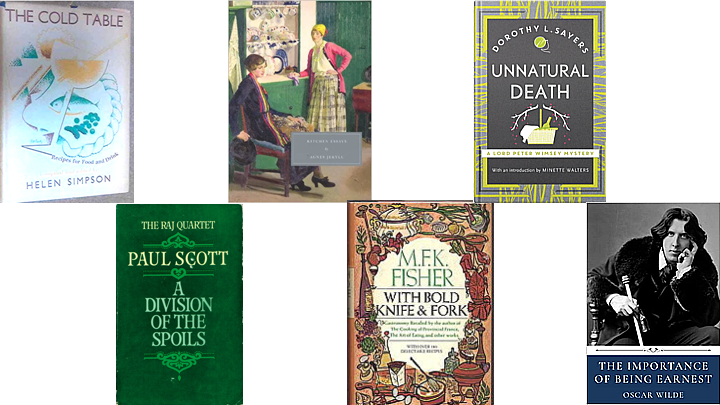The Sandwich: in this article in the Food in Literature series, Helen Garlick brings us the sandwich, with extracts from The Cold Table by Helen Simpson, The Raj Quartet by Paul Scott, Kitchen Essays by Agnes Jekyll, from With Bold Knife and Fork by MFK Fisher, Unnatural Death by Dorothy Sayers, and The Importance of Being Earnest by Oscar Wilde.
Zelie, of the Talking of Food team, who also contributed the extract from The Raj Quartet below, is the inspiration for this section on the sandwich. Or rather her Aunt Coral, who I so wished I had met. Aunt Coral sounds like a resourceful, discriminating and cultivated woman. She especially captured my imagination when Zelie recounted how she never embarked on a journey of any appreciable length without a well made ham sandwich. She took the view that, armed with this, she could survive any emergency or delay. A cancelled flight, a fallen tree across the line, being obliged to sit on a stationary train, or in a cold waiting room for several hours, or even an unscheduled overnight stop in a dismal hotel after the restaurant had closed, no matter what, she would be comforted and fortified.
The Cold Table: Helen Simpson 1935
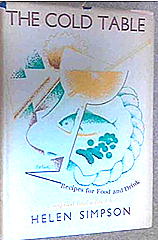 Helen Simpson gives us the well known derivation of the word "sandwich" as follows:
Helen Simpson gives us the well known derivation of the word "sandwich" as follows:
Sandwich: a piece of meat between 2 slices of bread; so called from the Earl of Sandwich (the noted Jeremy Twitcher} who passed whole days in gambling, bidding the waiter bring him for refreshment a piece of meat between two slices of bread, which he ate without stopping from play. This contrivance was not first hit upon by the Earl in the reign of George III, as the Romans were very fond of sandwiches, called by them offula.
Thus Brewer (Dictionary of Phrase and Fable 1894) in his account of the convention which now daily sustains a million breadwinners in western lands; eastern too, for ought I know, since where the bowler hat goes sandwiches may very well follow: "It is curious to think of this dashing edible, the sustenance of lords at their dice, coming to the support nowadays of school treats, business girls, stock jobbers, and debutantes dewy with primal innocence. But happily few are aware of its origins, and fewer still brood upon its inventor. He walked with a shamble, he was supremely unlucky at cards, and denied by Fate even the compensatory good fortune in love. Miss Ray, his delightful actress mistress, was shot as she left her theatre one night by an amorous clergyman. And now enterprising caterers make their fortunes out of the device by which his Lordship lost whole valleys."
I know, as has been explained in another place, nothing whatever about the Romans, therefore I begin and end my introduction of the sandwich with this brief note upon its eponym, and ignore the repulsively named offula as entirely as I may.
I have quoted from EM Forster elsewhere in this series. On that occasion he described with contempt how the British in India insisted on importing, and where that failed imitating, British food. A more affectionate example occurs in The Raj Quartet, by Paul Scott:
The Raj Quartet: Paul Scott
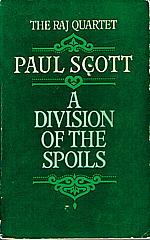 In the last volume, A Division of the Spoils, we pick up the story as Sarah Layton accompanies her fragile father, recently released from a POW camp in Germany, on the long train journey home from Delhi to Pankot. She has managed to pack the makings of a surprise breakfast for him.
In the last volume, A Division of the Spoils, we pick up the story as Sarah Layton accompanies her fragile father, recently released from a POW camp in Germany, on the long train journey home from Delhi to Pankot. She has managed to pack the makings of a surprise breakfast for him.
"Would you like a cold bacon sandwich?"
"Cold bacon?"
"Cold fried bacon. I got some last night in Ranpur from the station restaurant."
"Did you now! Then you ought to have a crown as well."
She laughed and opened the hamper which he had lifted down in readiness for breakfast… The cold fried rashers were wrapped in grease proof paper. "And a new loaf!" her father said.
"I got them to slice it. I hope it isn't dry."
"When was all this?"
"After we'd had dinner and you were seeing to the men. It's a surprise breakfast. Have a hard-boiled egg first?"
"Hard-boiled eggs too. Well done. No, I'll have a sandwich first."
When she was a child and before the years of exile in England, they had trekked on ponies through the Pankot hills, making camp at tea-time, striking camp at dawn.
"What's for breakfast?"" her father used to say. Hard boiled eggs and cold bacon sandwiches. With mugs of hot sweet tea. Eaten and drunk before the sun had risen and scorched the mist away…
Preparing a bacon sandwich now, she thought of how he had virtually lost a regiment. She handed it to him, as it were in compensation.
He waited until she had made one for herself and then, looking at each other like old conspirators, they bit in, holding their hands up to catch the crumbs.
"They taste better on a train," he said, after swallowing. "Something to do with the smoke and soot." She poured tea into the mugs. Because they both liked it sweet she'd had the milk and sugar added in the flask. A thick strong picnic brew.
Some time later, Colonel Layton organises a surprise breakfast for Sarah on their early morning ride. He takes her on an unexpected detour to a derelict dak bungalow where they are met by two boy servants. Sarah continues the story…
Ashok led the horses round to the back. We went up the rickety steps to the ruinous-looking but in fact still quite stout verandah. On the wooden table Fariqua had spread out the feast on a coloured cloth: thermos, cups, a pot of sugar, pot of salt, spoons, plates, unnecessary knives and forks, stacks of sandwiches wrapped in paper already appetisingly stained with what looked like bacon fat…
He (her father) opened the first package of sandwiches.
"They won't be a patch on those we had on the train," he said. "Bacon sandwiches have to mature a bit, don't they? Crisp but not brittle. Not too moist, not too dry. I'm afraid this batch only got put down an hour ago. All the same they don't smell too bad."
And they tasted good. We munched for a while, content.
Kitchen Essays: Agnes Jekyll
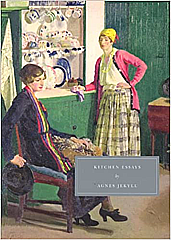 I have also quoted the magnificent Agnes Jekyll elsewhere. In her chapter entitled Food For Artists and Speakers, the grande dame considers what sustenance a hostess should provide to public speakers and performers. They should not be fed a substantial meal before they speak but at the same time, post performance, they may feel exhausted and a heavy meal could interfere with their rest.
I have also quoted the magnificent Agnes Jekyll elsewhere. In her chapter entitled Food For Artists and Speakers, the grande dame considers what sustenance a hostess should provide to public speakers and performers. They should not be fed a substantial meal before they speak but at the same time, post performance, they may feel exhausted and a heavy meal could interfere with their rest.
Those who have sown unto us spiritual things have a claim on the harvest of our worldly things; for, unless well cared for materially, they can neither raise mortals to the skies, not yet call angels down. Parliamentary elections, too, have horrid possibilities of recurrence, with their nightmare train of exhausting effort and disordered home life; and a little care in the selection and preparation of suitable foods may even turn the tide of fortune, and enable politicians to scorn fatigue or illness and lead on to victory.
These seem like extraordinary claims to be made for the effects of a sandwich. However Agnes is not suggesting something ordinary but rather:
Tartines Tricolor
Take thin round slices, 2½ to 3 inches across, from a long French roll or fresh loaf, butter sparingly, and lay slantingly across these open rounds thin strips alternately of white chicken (or turkey), of red tongue (or ham), of pickled cucumber (or mildly salted gherkin), varied by a thin fillet of anchovy washed in milk if too salt, and dish these flat with a light sprinkling of small cress in the centre.
For those who might feel utterly daunted, she condescendingly provides an alternative.
An alternative might be the small oblong crisp toast sandwiches popular at West End Bridge clubs, with a tiny roll, little finger size, of crisply fried streaky bacon, served in covered muffin dishes piping hot, and welcome on a chilly night.
What would the Earl have said if presented with a couple of these?
With Bold Knife and Fork: MFK Fisher
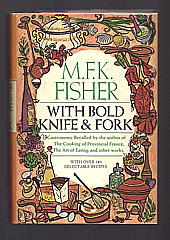 Another of my favourites, MFK Fisher, recalls:
Another of my favourites, MFK Fisher, recalls:
The nasturtium-leaf sandwiches at Mrs Thayer's ranch, north of ours. Usually I played outside there, pretty much like a wild Indian, but now and then I would be invited with my mother to drink tea in the dim parlour… probably to learn a few manners, by which both ladies set commendable store. The little white morsels were almost as thin as the croque monsieurs at the Old Palace, probably put under a weight once made, and it seems that the tender leaves that lay between the blankets of sweet butter and fine white bread should be gathered with the dew on them. Ah, yes.
However, she also recalls the humiliation when, aged eleven, she attended a new school in the country and instead of a ready made sandwich, either home made or shop bought, her mother sent her with a lunch box containing the ingredients for her to make her own.
It was what the society editor of The News would call "a dainty collation", and it cost me about two weeks of trust and acceptance from my bucolic companions. The whole thing was a humiliating disaster, decades beyond then in forgiveness and generosity: a silver knife for spreading the neat packet of bread slices; two small screw-top jars which had once held samples of some kind of face cream, now filled with mayonnaise and blackberry jam; salt and pepper in little wax paper which spilled onto my skirt; a ripe sliced tomato which followed them into my lap and raised a good laugh from my fascinated mates as they downed their thick pieces of bread with a slab of last night's pot roast between them. Marjie Thayer, who had been my ally for several years before we moved to the ranch next to hers, acted with therapeutic brutality and compassion and cracked me on the head with the hard boiled egg in its shell which rolled out last.
She reflects on the truly awful examples she has been forced to eat, while travelling. On the other hand, there have been perfect examples, such as:
… a small cold French railway station at dawn, if one reaches down in the steamy gassy air towards a little buffet wagon trundling along the quay, and brings up a sandwich made of a fresh long roll with ham dangling out of it and good butter to hold it together.
The ham sandwich again.
She then gives us her family's tried and tested favourite, the "Railroad Sandwich".
Take a French loaf, slice the loaf from end to end in two solid pieces, and then carefully remove all you can of the inner crumbs. All! Spread the two hollow shells generously with butter and with judicious smears of mustard if desired. Lay upon the bottom half of the loaf plenty of ham slices, overlapping thickly. Tuck them in a little at the edges, but not too neatly; a fringe is picturesque to some, and pleasantly reminiscent. To my family it is essential. Put the two halves firmly together, and wrap them loosely in plastic, or foil or wax paper, and then a clean towel. Then, and this is the Secret Ingredient, call upon a serene onlooker (a broad or at least positive beam adds to the quick results, and here I do not refer to a facial grimace but to what in other dialects is called a behind — derriere, bum, ass, seat etc.) to sit gently but firmly upon this loaf for at least twenty minutes.
Finally a perfect ham sandwich also featured in one of the cases investigated by the divine Lord Peter Wimsey in:
Unnatural Death: Dorothy Sayers.
 Lord Peter is examining a murder scene in Epping Forest when he discovers the remnants of a ham sandwich. His companions write it off as the unconnected remains of an innocent picnic but…
Lord Peter is examining a murder scene in Epping Forest when he discovers the remnants of a ham sandwich. His companions write it off as the unconnected remains of an innocent picnic but…
"Cast your eye, and your nose, upon this ham sandwich."
"What's wrong with it?" enquired Parker.
"Nothing. It appears to be in astonishingly good preservation, thanks to this admirable oak tree… but I am puzzled by the incongruity between the sandwich and the rest of the outfit."
"It's an ordinary ham sandwich isn't it?"
"Oh, gods of the wine flask and the board, how long? how long? It is a ham sandwich Goth but not an ordinary one. Never did it see Lyon's kitchen, or the counter of the multiple store, or the delicatessen shop in the back street. The pig that was sacrificed to make this dainty titbit fattened in no dull style, never knew the daily ration of pig wash or the not unmixed rapture of the domestic garbage pail. Observe the hard texture, the deep brownish tint of the lean, the rich fat, yellow as a Chinaman's cheek, the dark spot where the dark treacle cure has soaked in, to make it a dish fit to lure Zeus from Olympus… (these are) sandwiches made from coalblack treacle cured Bradenham ham, which long ago ran as a young wild boar about the woodlands, till death translated it to an incorruptible and more glorious body. I may add that it costs about 3s a pound uncooked… an argument which you will allow to be weighty."
"That's odd, certainly," said Parker, "I imagine that only rich people…"
"Only rich people, or people who understand eating as a fine art," said Wimsey. "The two classes are by no means identical though they occasionally overlap."
You will have to read on to discover, or remind yourself of the significance of the Bradenham ham. However, that's probably quite enough ham. Though, of course, no discussion about the sandwich would be complete without reference to the cucumber sandwich and to the most famous of all, in:
The Importance of Being Earnest: Oscar Wilde
ALGERNON: How are you, my dear Ernest? What brings you up to town?
JACK.: Oh, pleasure, pleasure! What else should bring one anywhere? Eating as usual, I see, Algy!
ALGERNON: (Stiffly) I believe it is customary in good society to take some slight refreshment at five o'clock. Where have you been since last Thursday?
JACK: (Sitting down on the sofa) In the country.
ALGERNON: What on earth do you do there?
JACK: (Pulling off his gloves) When one is in town one amuses oneself. When one is in the country one amuses other people. It is excessively boring.
ALGERNON: And who are the people you amuse?
JACK: (Airily) Oh, neighbours, neighbours.
ALGERNON: Got nice neighbours in your part of Shropshire?
JACK: Perfectly horrid! Never speak to one of them.
ALGERNON: How immensely you must amuse them! (Goes over and takes sandwich) By the way, Shropshire is your county, is it not?
JACK: Eh? Shropshire? Yes, of course. Hallo! Why all these cups? Why cucumber sandwiches? Why such reckless extravagance in one so young? Who is coming to tea?
ALGERNON: Oh! merely Aunt Augusta and Gwendolen.
JACK: How perfectly delightful!
ALGERNON: Yes, that is all very well; but I am afraid Aunt Augusta won't quite approve of your being here.
JACK:May I ask why?
ALGERNON: My dear fellow, the way you flirt with Gwendolen is perfectly disgraceful. It is almost as bad as the way Gwendolen flirts with you.
JACK: I am in love with Gwendolen. I have come up to town expressly to propose to her.
ALGERNON: I thought you had come up for pleasure? … I call that business.
JACK: How utterly unromantic you are!
ALGERNON: I really don't see anything romantic in proposing. It is very romantic to be in love. But there is nothing romantic about a definite proposal. Why, one may be accepted. One usually is, I believe. Then the excitement is all over. The very essence of romance is uncertainty. If ever I get married, I'll certainly try to forget the fact.
JACK: I have no doubt about that, dear Algy. The Divorce Court was specially invented for people whose memories are so curiously constituted.
ALGERNON: Oh! there is no use speculating on that subject. Divorces are made in Heaven—(Jack puts out his hand to take a sandwich. Algernon at once interferes) Please don't touch the cucumber sandwiches. They are ordered specially for Aunt Augusta. (Takes one and eats it)
JACK: Well, you have been eating them all the time.
ALGERNON: That is quite a different matter. She is my aunt. (Takes plate from below) Have some bread and butter. The bread and butter is for Gwendolen. Gwendolen is devoted to bread and butter.
JACK: (Advancing to table and helping himself) And very good bread and butter it is too.
ALGERNON: Well, my dear fellow, you need not eat as if you were going to eat it all. You behave as if you were married to her already. You are not married to her already, and I don't think you ever will be.
(Enter Lane)
LANE: Lady Bracknell and Miss Fairfax.
(Algernon goes forward to meet them. Enter Lady Bracknell and Gwendolen)
LADY BRACKNELL: Good afternoon, dear Algernon, I hope you are behaving very well.
ALGERNON: I'm feeling very well, Aunt Augusta.
LADY BRACKNELL: That's not quite the same thing. In fact the two things rarely go together. (Sees Jack and bows to him with icy coldness)
ALGERNON: (To Gwendolen) Dear me, you are smart!
GWENDOLEN: I am always smart! Am I not, Mr. Worthing?
JACK: You're quite perfect, Miss Fairfax.
GWENDOLEN: Oh! I hope I am not that. It would leave no room for developments, and I intend to develop in many directions.
(Gwendolen and Jack sit down together in the corner)
LADY BRACKNELL: I'm sorry if we are a little late, Algernon, but I was obliged to call on dear Lady Harbury. I hadn't been there since her poor husband's death. I never saw a woman so altered; she looks quite twenty years younger. And now I'll have a cup of tea, and one of those nice cucumber sandwiches you promised me.
ALGERNON: Certainly, Aunt Augusta. (Goes over to tea-table)
LADY BRACKNELL: Won't you come and sit here, Gwendolen?
GWENDOLEN: Thanks, mamma, I'm quite comfortable where I am.
ALGERNON: (Picking up empty plate in horror) Good heavens! Lane! Why are there no cucumber sandwiches? I ordered them specially.
LANE: (Gravely) There were no cucumbers in the market this morning, sir. I went down twice.
ALGERNON: No cucumbers!
LANE: No, sir. Not even for ready money.
ALGERNON: That will do, Lane, thank you.
LANE: Thank you, sir. (Goes out)
ALGERNON: I am greatly distressed, Aunt Augusta, about there being no cucumbers, not even for ready money.
LADY BRACKNELL: It really makes no matter, Algernon. I had some crumpets with Lady Harbury, who seems to me to be living entirely for pleasure now.
You can watch an abbreviated version of this scene from the wonderful film with Michael Redgrave, Michael Dennison and Dame Edith Evans in our Movie Clips gallery.

